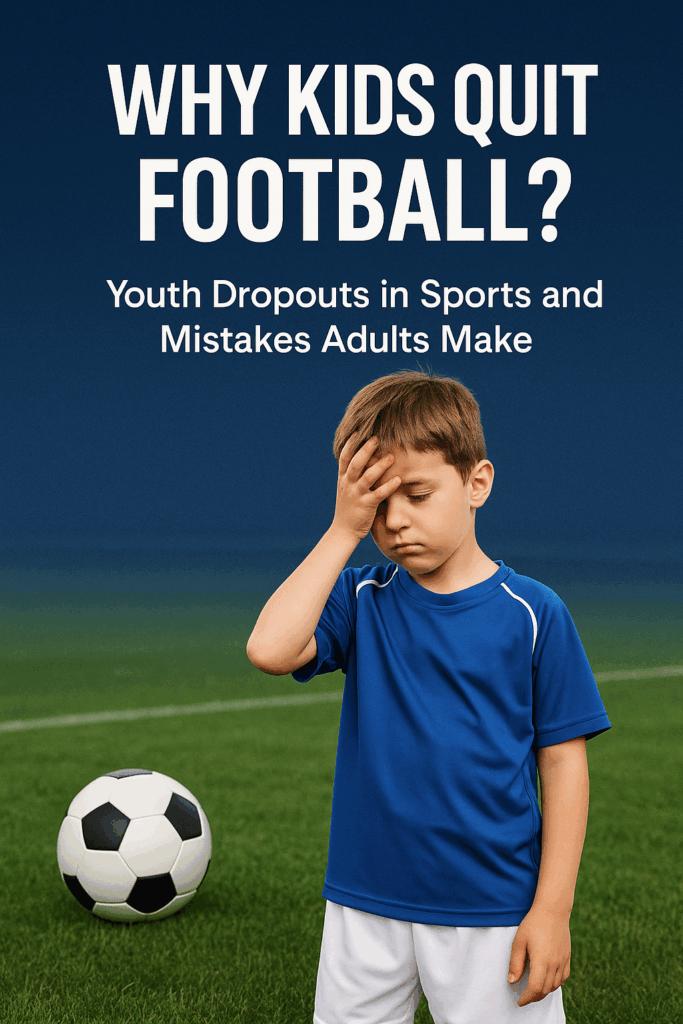The Hidden Reasons Behind Youth Dropout in Sports and How Adults Can Fix It
Why Kids Quit Football: Search Intent
Informational + Problem-Solution
Targeting parents, coaches, academies, and sports psychologists looking for reasons behind Why Kids Quit Football and actionable solutions.
Why Kids Quit Football: The Passion Gap in Modern Youth Football
Every year, thousands of kids enroll in football academies with spark in their eyes. But fast forward a few years, and many of them silently leave the sport. According to data from the Aspen Institute’s Project Play, over 70% of children drop out of organized sports by age 13.
And football — the world’s most loved game — is not immune.
So, what’s happening?
While some drop out due to changing interests, the root cause often lies with adults: parents, coaches, clubs — even unintentionally.
This article explores why kids quit football, how adult behavior fuels the trend, and what can be done to restore joy, motivation, and long-term engagement in the game.
Section 1: The Shocking Stats Behind Youth Dropout in Football
Let’s start with real numbers.
Key Statistics:
- 70% of kids drop out of sports by age 13 (Aspen Institute)
- 1 in 3 say it’s “no longer fun”
- 45% cite too much pressure from parents/coaches
- Only 23% of kids say winning is the reason they play
Source Entities: Aspen Institute, FIFA Grassroots Reports, UEFA Youth Survey 2023
Section 2: 7 Adult Behaviors That Push Kids Away from Football
1. Overemphasis on Winning Early
When adults prioritize trophies over development, kids feel stressed and evaluated constantly. They stop playing for fun and start fearing mistakes.
❌ “You didn’t score again today — what’s going on?”
✅ “You worked hard today, and your positioning really improved!”
NLP Concepts: performance pressure, fear of failure, goal orientation
2. Why Kids Quit Football: Parents Living Through Their Kids
Some parents unintentionally live out their dreams through their children, turning every game into a reflection of their own ego.
Red Flags:
- Videoing every match with criticism
- Fighting over playing time
- Pushing for elite academies too soon
Real example: A 9-year-old in Spain quit football after his dad made him change clubs three times in one year to “chase exposure.”
3. Coaches Who Lead with Fear, Not Trust
A study in the Journal of Applied Sport Psychology shows that supportive coaching increases athlete retention by 60%.
Toxic behaviors like shouting, favoritism, or benching without explanation erode motivation and confidence.
✅ Effective coaches give feedback like: “Let’s work on your weak foot — you’re close to getting it right.”
4. Burnout from Overtraining & Over-Scheduling
Football 5–6 days a week. Games on weekends. Private coaching on top.
Children aren’t mini-adults. Without balance, they suffer emotional fatigue and physical burnout.
Symptoms:
- Loss of enthusiasm
- Mood swings
- Poor sleep and stress-related injuries
5. Lack of Free Play and Creativity
Street football — once the engine of player creativity — has disappeared in many places. Over-structured training kills the “sandbox” phase of development.
“Street play” kids like Ronaldinho, Neymar, and Modrić developed vision and flair because they were allowed to explore the game.
Let’s bring that back.
6. Comparison Culture & Fear of Not Being “Good Enough”
With Instagram highlights, scouting accounts, and academy rankings, kids as young as 10 start comparing themselves constantly. This creates a distorted sense of self-worth, where likes, views, or rankings define their value as athletes. Instead of focusing on skill development, they may become obsessed with how they “look” online. This also increases anxiety, especially if they feel they’re falling behind their peers in exposure or achievements. Over time, this constant comparison chips away at intrinsic motivation, replacing joy with pressure to perform for an audience.
7. No Emotional Connection or Internal Drive
Sometimes, kids lose interest simply because they never loved football — they were just told they should.
Or, they did love it, until it became all about expectations, rules, and obligations.
✅ Ask your child: “What do you want from football?”
Section 3: What Kids Actually Want — and How We Can Deliver
According to FIFA Grassroots Development:
Children play sports to:
- Have fun
- Be with friends
- Learn and improve
- Feel good and be praised
- Compete — but in a healthy way
So let’s build that environment.
✅ Section 4: Why Kids Quit Football: How to Keep Them in the Game
For Parents:
- Focus on process, not outcome
- Avoid comparing your child with others
- Support their emotional journey, not just the physical
For Coaches:
- Create safe, trusting relationships
- Include fun-based training exercises
- Set realistic and age-appropriate expectations
For Academies/Clubs:
- Encourage multi-sport play under 12
- Limit competitive stress under 10
- Train coaches in emotional intelligence and communication
In Brief
| Problem | Adult Behavior | Fix |
|---|---|---|
| Drop in motivation | Too much pressure | Encourage intrinsic motivation |
| Burnout | Overtraining | Include rest and free play |
| Anxiety | Toxic comparison | Promote self-driven goals |
| Quitting football | Lack of joy | Bring fun and freedom back |
Final Word: Let Football Be Theirs, Not Ours
Keeping kids in football needs a holistic approach that includes coaches, parents, and all youth football organizations. The goal should be to keep kids playing as long as we can whether it be recreationally or at more elite levels. In order to foster that long term desire to play, we have to change the perspective of youth sports and look at the impacts of a winning-first mentality from both parents and coaches. Introducing this type of mentality too young will continue to push kids away from sports overall. By emphasizing skill development, fostering inclusivity, and creating a fun and supportive environment, we can keep kids in sports longer!
Football can be a lifelong passion, a career, or just a playground for growth. But only if we — the adults — don’t ruin it…not to ever ask why kids quit football!
Let’s step back, listen more, pressure less, and bring joy back to youth football.
When football belongs to the child, it becomes a gift. When it belongs to the adult, it becomes a burden.









